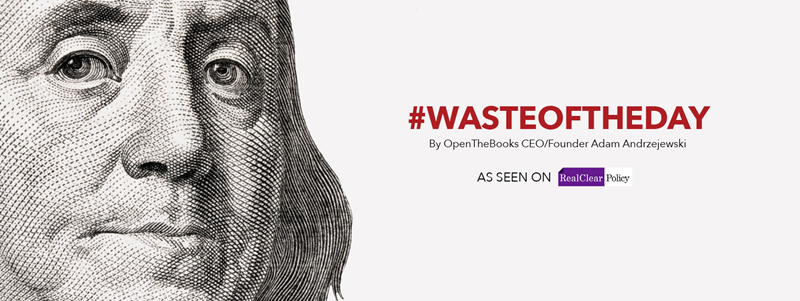
Department of Commerce Spends $300M on “Digital Equity” Plans
June 6, 2022
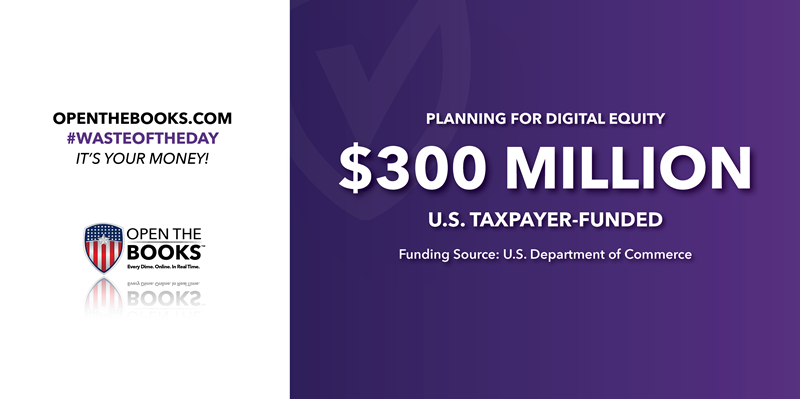
The U.S. Department of Commerce’s National Telecommunications and Information Administration has a new grant program giving out $300 million to promote digital equity, according to a recent grant notice.
The $300 million in funding for the State Digital Equity Planning Grant Program appropriated by Congress is intended to help states develop “digital equity plans.” These plans should “identify barriers to digital equity in the State and strategies for overcoming those barriers.”
A special emphasis on digital equity for Native Americans is expected in states with large indigenous populations. Digital equity is defined by the Department of Commerce as “the condition in which individuals and communities have the information technology capacity that is needed for full participation in the society and economy of the United States.”
It’s important to note that this program isn’t for delivering digital equity. This $300 million is just for states to come up with a plan.
Most of the programs’ goals focus on broadband access, but there is also much that is left up to states’ discretion. The notice claims “Internet connectivity itself is a necessary, but not sufficient, condition for eradicating the digital divide. Many on the wrong side of that divide require equipment, digital skills, financial resources, and more to realize the Internet’s full potential. Those who lack these resources face substantial barriers to digital equity, even in places where fast broadband connections are physically available."
Whether achieving digital equity through expanded broadband access is a laudable goal or not is separate from the absurdity of spending $300 million just to come up with a plan for it.
Congress Could Spend Up to $1.5M Per Year on Staff Peloton Memberships
June 7, 2022
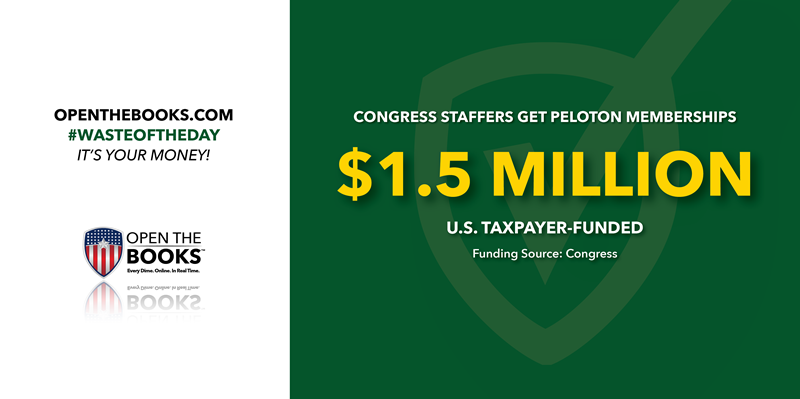
House of Representatives staff and Capitol Police officers can receive free Peloton membership at taxpayers’ expense, according to a recent Fox Business report.
In an announcement from the House of Representatives Office of the Chief Administrative Officer, Congress will give staffers and officers free membership to the popular stationary bicycle Peloton app and Peloton all-access, costing up to $1.5 million annually if all employees take advantage of the offering.
Peloton brokered a special deal, charging Congress $10 per month for each employee that takes advantage of the deal, as well as an upfront $10,000.
A Peloton all-access membership costs $39 per month and a Peloton app membership retails for $12.99 per month.
The perk could cost up to $123,000 per month if all eligible congressional employees and officers take advantage of it, adding up to $1.5 million per year.
The special deal between Congress and Peloton comes after Peloton hired both an in-house lobbyist and two lobbying firms in March 2021, according to MarketWatch.
The in-house lobbyist will focus on “'Made in America’ manufacturing investment” and “legislation in support of social justice and human equality issues,” according to one disclosure, MarketWatch reported. Another focus will be “policymaking and government programming to support health and wellness of Americans, in particular during COVID-19 recovery.”
While it’s common for employers to offer perks such as gym memberships and fitness programming, the House and Senate both have gyms limited to representatives and senators.
The additional perks come as the House recently announced a new minimum salary of $45,000 per year for staffers.
Study: Climate Causing Young People Mental Health Issues?
June 8, 2022
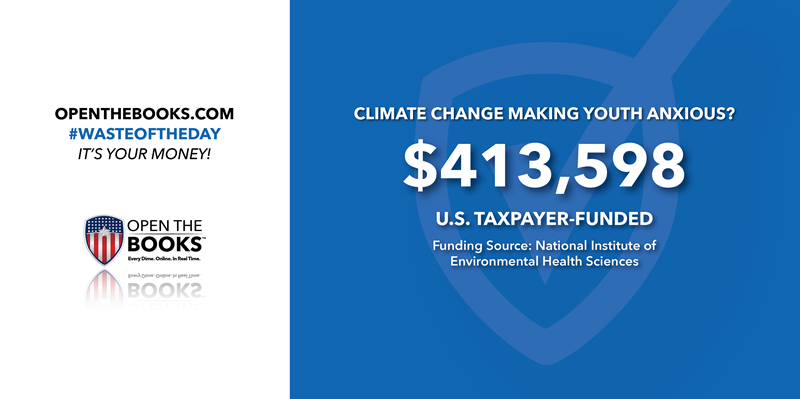
This year, the National Institute of Environmental Health Sciences gave $413,598 to researchers at Appalachian State University in North Carolina to study how climate change impacts the mental health of young people.
An abstract for the research project states that research shows environmental factors like increasing temperatures and heat waves might create negative mental health and well-being outcomes for youth.
“A recent survey showing 7 out of 10 young people are worried about their future in the context of these planetary changes,” the abstract states.
The researchers are hoping to glean youth’s attitudes toward climate change from their relationship with Crisis Text Line, “a global not-for-profit organization that provides free, 24/7, and confidential text-based crisis response service,” they said.
The crisis line will provide data for the researchers by showing people that seek mental health help in response to extreme climate events of hurricanes, wildfires, and heatwaves.
This research is relevant, the researchers say, because adolescence and young adulthood are often when mental health disorders develop.
“Despite the frequency of climate-related natural disasters, like hurricanes, wildfires, and heatwaves, little is known about their effects on mental health in this group,” they said.
“The proposed research will further knowledge on the impact of mental health from climate disasters using a quasi-experimental design that seeks to tease out causal effects to build a robust evidence base for climate and mental health relationships.”
It’s probably safe to say the researchers will find a correlation between climate change and mental health issues and seek additional federal money to fund more research on how to address it.
U.S. Spent $98K to Study Volunteer Military After It Already Had One
June 9, 2022
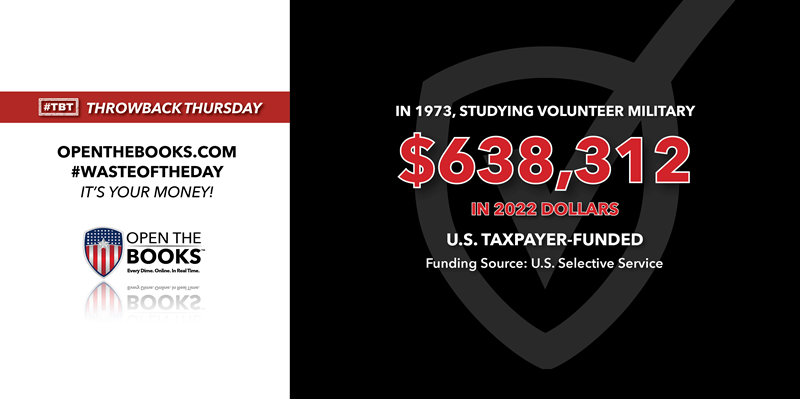
Throwback Thursday!
In 1973, the U.S. Selective Service System spent $98,029 — $638,312 in 2022 dollars — on the study of all-volunteer military forces in foreign countries. This may have made sense if the U.S. hadn’t just eliminated the draft.
Sen. William Proxmire, a Democrat from Wisconsin, awarded the Selective Service System his Golden Fleece Award for this wasteful study.
Proxmire compares funding this study to “the Redskins or Packers devising a Super Bowl strategy after the Super Bowl is over.”
This study may have provided helpful information about the benefits of switching to such a system, but after the switch was made, this study became obsolete.
In addition to its frivolity, a number of factors make this contract suspect. It was awarded to Kenneth Coffey, who negotiated the contract while he was still a public relations officer at the Selective Service System, and it was awarded just after he left the agency.
He was also the only applicant for this project, and the agency used a loophole to avoid publicly advertising the grant opportunity, Proxmire said.
After the contract was awarded, Coffey made $30,000, plus $4,500 in fringe benefits, $7,000 for travel, $6,000 per diem for his 175 days abroad, and over $6,000 in profit by incorporating himself. In addition, he bankrolled his wife on this project as a part time assistant.
Perhaps this study was funded more due to nepotism than need.
Covid Aid Helped California to $97.5B Surplus
June 10, 2022
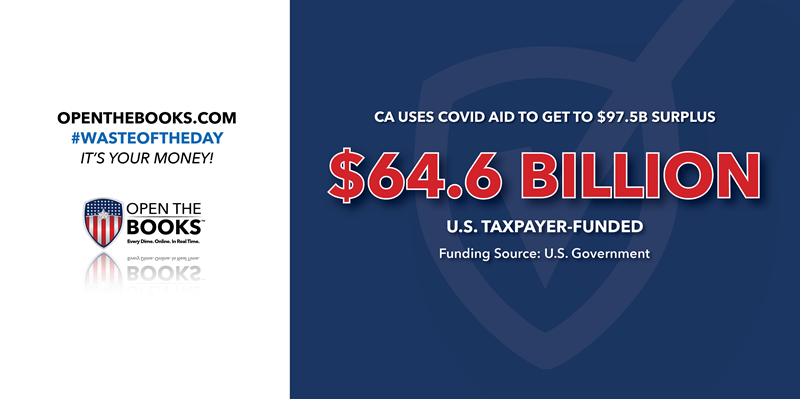
As Covid continues to wane in the U.S., the effects of the trillions of dollars in Covid spending are manifesting. While some of the funds were needed to weather the pandemic, others let states pad their bank accounts. In California, Gov. Gavin Newsom announced the state has a $97.5 billion surplus, according to NBC News.
Newsom and others have attributed the surplus to rising income tax revenue. But for the past two years, states have seen exorbitant amounts of federal funds come in thanks to Covid relief.
In 2020, the CARES Act sent California $15.3 billion, which was spent on everything from education to healthcare to temporary welfare programs. Then, in 2021, the American Rescue Plan sent California and its municipalities an additional $42.6 billion. The Consolidated Appropriations Act of 2021 sent another $6.7 billion. This list of $64.6 billion isn’t exhaustive of all federal money flowing to states during the pandemic.
All of this aid came at a time when state revenues across the U.S. were “virtually flat” compared to pre-pandemic, with JPMorgan finding revenues dropped 0.12 percent from 2019 to 2020, according to Fox News.
These direct payments to states have disproportionately benefited blue states, since most are based on population. In the case of the American Rescue Plan, the apportionment was calculated based on unemployment, so blue states with big cities and high unemployment also made out with the most cash.
Fiscally irresponsible states like New York, Illinois and California, all in the top six of states with the highest debt per capita, shouldn’t be bailed out by the federal government in times of crisis. The moral hazard created by this precedent will only encourage states to spend more irresponsibly, knowing the federal government will protect them.
The #WasteOfTheDay is presented by the forensic auditors at OpenTheBooks.com.